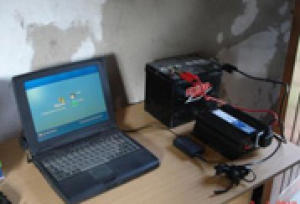Developing countries to benefit from science through solar power – scientists
Monday, December 12th, 2011 6:03:18 by Taimoor Tariq
Developing countries to benefit from science through solar power – scientists
A chemistry academic at the University of Southampton is using solar generators in order to provide IT resources and hands-on science for students in the developing countries.
Teaching science and IT related subjects in rural areas of many developing countries is a major difficulty as most of the students hardly get a chance to actually experience the experiments that they read about in the books.
This is largely due to lack of infrastructure and also lack of electricity. In many parts of most developing countries, supply of electricity is a major concern.
Now, a visiting professor at the University of Southampton, Tony Rest and Keith Wilkinson who taught for some time in Zambia have invented a solar-powered solution to this quandary.
This is based on a digital projector and low-cost solar energy panels which means that the students can access to IT and to other new-age teaching methods.
Professor Rest says: "The lack of electricity is a particularly serious matter for rural schools and this situation is unlikely to get better in the near to medium future. With drawbacks to petrol generators, due to difficulties in getting supplies and safety
hazards, solar energy generators have become available at cost-effective prices and provide a sustainable answer as rural schools have an abundance of the basic energy source required to power them — sunshine.
At least 200-300 watts of energy are required to run most of the projectors which can’t be economically sustained by solar power especially in rural areas. However, the mini-projectors require only 50 watts of power which is very feasible to help students
experience science the way it is.
The solar energy generators, which consist of solar panels, batteries and inverters, can be linked to the projector for students to get practical classes via multimedia resources to show laboratory experiments and stress practical techniques.
Professor Rest adds: "These experiences can be extended to other science subjects from physics, biology and maths, to subjects involving practical elements, such as engineering, and to craft subjects, including plumbing, carpentry, and catering, where students
need see how to acquire skills. By extending the breadth of subjects benefiting from the use of IT, the overall cost of using a solar energy generator is reduced. Another spin-off is that students in rural schools gain access to valuable IT skills."
Tags: IT, keith wilkinson, solar panels, tony rest, university of southampton
Short URL: https://www.newspakistan.pk/?p=5967

















